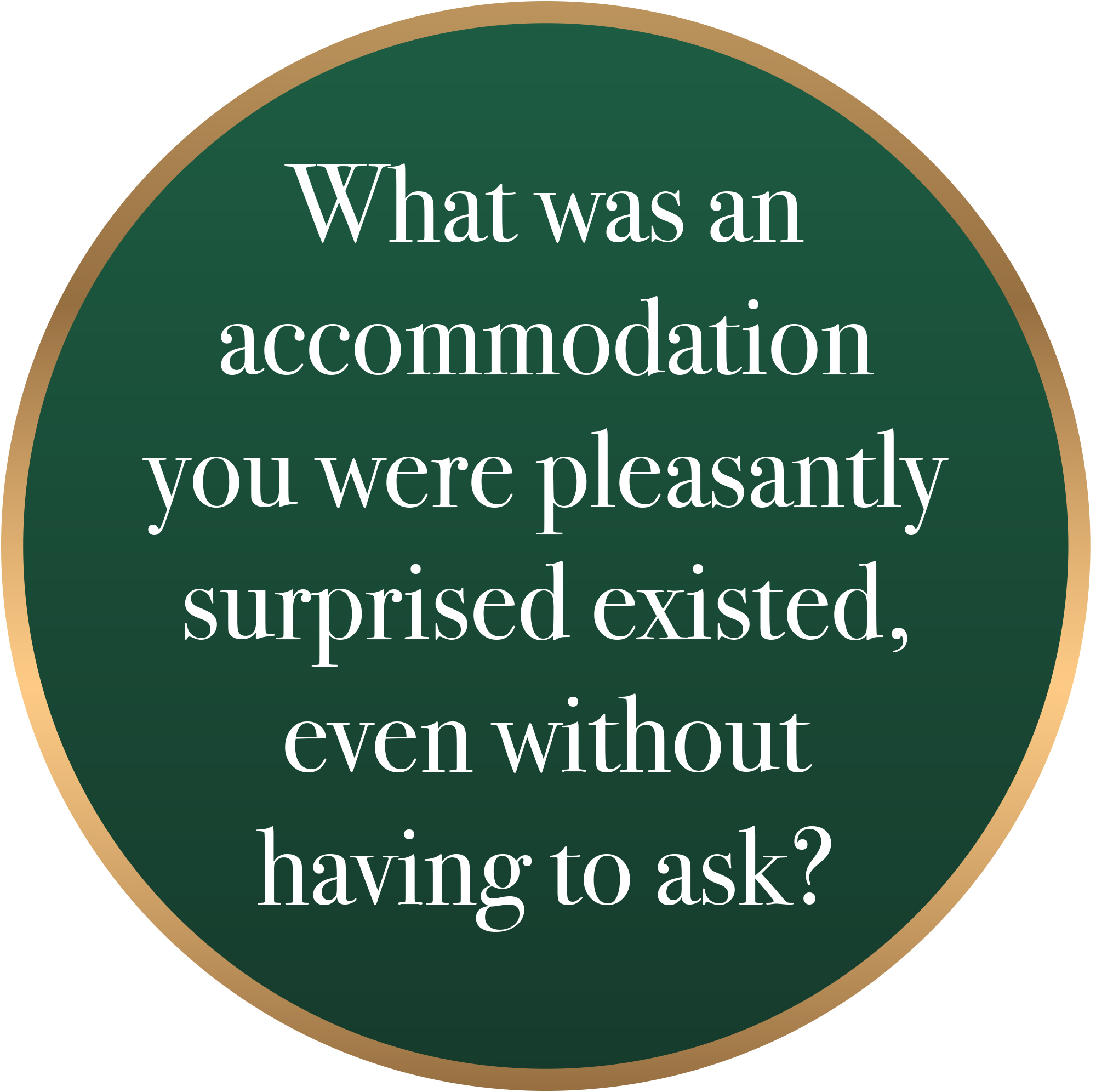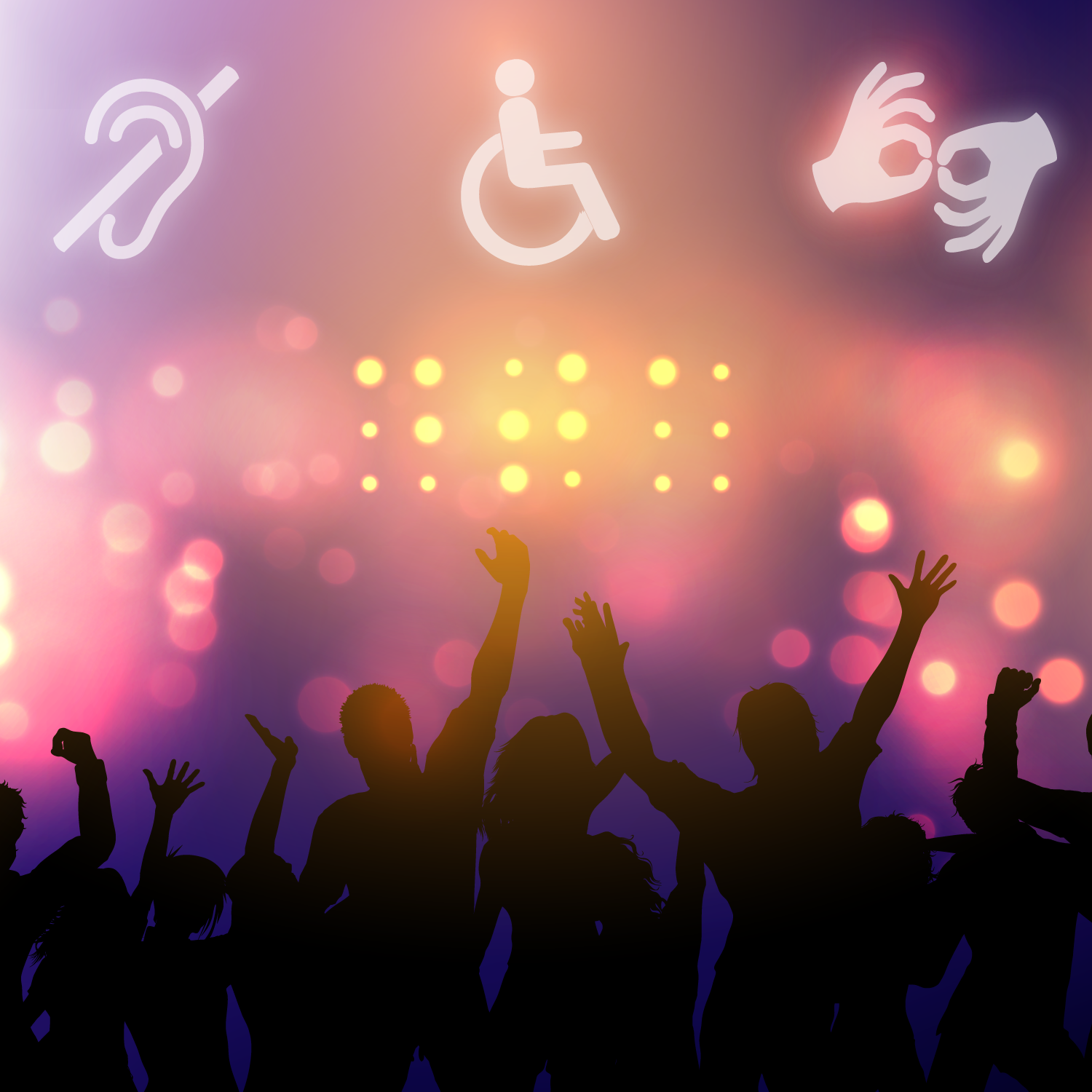It feels like disabled folks are constantly having to ask for accessible options or accommodations, but it sure is nice when we don’t have to.
In addition to things like being able to roll into a venue and be able to access the bathroom, dressing room, and stage with a wheelchair; not using strobe lights or fog; or having ASL interpreters, some venue owners and producers go above and beyond to accommodate performers and audience members with disabilities.
Existing accommodations and accessibility options for disabled performers and audience members increase attendance and create a positive experience.
We recently asked folks what accommodations they were pleasantly surprised to find around their communities and it was captivating to hear people celebrate the wins they’ve experienced.
“Offering free earplugs at an event! I didn’t get overstimulated and had so much more fun.”
One way to make music events more accessible is by offering solutions for those with sensory issues. It can be very comforting to find a venue that utilizes strobe light warnings or earplugs. There are even venues popping up locally that have Quiet Rooms (or something similar), that allow people a space to escape the stimulation
“Producers told the tech team not to use strobes while I was at a show.”
Going one step further than just giving strobe light warnings, not having them on at all ensures the safety of folks with epilepsy or other conditions that strobe lights could aggravate. There are few times when strobes actually enhance an act, so it’s safer to not use them at all.
“..The first time Bluetooth hearing aids came around and I could listen to music with built-in headphones. Best invention ever.”
As technology advances, accessibility items are becoming more advanced as well. There are constantly new options in sound technology that make music events more accessible and enjoyable for those who haven’t had those experiences before. It can be empowering that things like musical vests, more advanced headphones, and even ASL translators have seen an increase in recent years.
“Period products in the bathroom!” “I love seeing gender-neutral language regarding menstrual products, especially at my library.”
About half of us have found ourselves in need, but without a menstrual product or change to buy one – or even more frustrating, the products are not offered in the bathroom at all. It is always delightful to find that you have access to period products when you need them, regardless of your finances or gender. As gender care becomes more prevalent, there has also been an uptick in the availability of period products for everyone.

Some other responses to our post include:
- Note takers in college! They helped me bunches.
- While I was in the immediate recovery of my last injury I was pleasantly surprised to find wheelchairs available at my doctor’s office so I didn’t have to walk all over the place on my walker. It feels like a no brainer in retrospect but I definitely did a lot of walker hobbling in doctor offices with the injury before that.
- When a venue was renovating the front bar, the only entrance was on the side. I was fully prepared to lift my chair and take a couple steps to get over the curb and step, but security walked into the bar, and moments later they brought out a temporary folding ramp. I used it to get in, and they took it back inside.
- The staff at a local bar are really good about seeing and serving me (a wheelchair user) amongst the other people trying to get their attention even though I’m basically at bar height, much shorter and less noticeable than others.
- Disney World makes amazing accommodations across the board. But the one that makes me feel most at ease is at their restaurants. Let the waitress know and the chef personally comes out for a chat. They work with you to create food that you can eat regardless of what the menu says. It’s one of the only places other than my home that I feel comfortable eating.
- When I was teaching traditional face to face courses for my literature students I kept stress balls in my backpack for my students cause I know I’m fidgety and a lot of my stimming involves my hands. Even students without any sort of “known” neurodivergence were very enthusiastic about being able to do things with their hands while we talked about all the things.
No matter what, it is always nice to find ourselves with options to make life more accessible for us. It is also important for us to note accommodations that don’t apply to ourselves and celebrate efforts for inclusivity. Next time you find yourself finding a new option, maybe tell your friends, post an online review, or even thank the owner/manager. While a response is never necessary and sometimes it’s not the time, these little actions are ways to encourage more accessibility across the board.
Examples of great accessibility features and available accommodations:
- 4 Music Venues That Do Accessibility Right in the Land (Cleveland, OH)
- Adventure Science Center (Nashville, TN)
- Minnesota Orchestra (Minneapolis, MN)
- US Bank Stadium Sensory Room [Sensory Friendly] (Minneapolis, MN)
Learn more:
- 12 tips to make events more accessible and inclusive (Canva)
- A Planning Guide for Making Temporary Events Accessible to People With Disabilities (ADA National Network, 2015)
- Bars without barriers: how can venues prioritise accessibility? (The Spirits Business)
- How can clubs become more accessible for those with disabilities? (DJ Mag)
- Kulture City (Sensory Inclusion Certification)
- Minneapolis Cocktail Lounge Prioritizes Accessibility for All Patrons (Bar and Restaurant Magazine)

Read last month’s post which answers the question “What is one thing you wish people knew about disabilities?”

